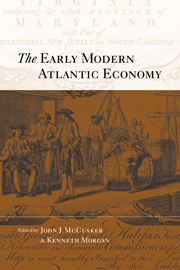Book contents
- Frontmatter
- Contents
- List of figures
- List of tables
- List of abbreviations
- List of contributors
- Dedication
- Introduction
- Part I The role of merchants and their connections
- Part II The development of trades
- 3 Property versus commerce in the mid-eighteenth-century port of London
- 4 Irish businessman and French courtier: the career of Thomas sutton, comte de Clonard, c. 1722–1782
- 5 ‘A revolution in the trade’: wine distribution and the development of the infrastructure of the Atlantic market economy, 1703–1807
- 6 Law, credit, the supply of labour, and the organization of sugar production in the colonial Greater Caribbean: a comparison of Brazil and Barbados in the seventeenth century
- 7 The revolutionary impact of European demand for tropical goods
- 8 The business of distilling in the Old World and the New World during the seventeenth and eighteenth centuries: the rise of a new enterprise and its connection with colonial America
- Part III Imperial economies
- Part IV Colonial working societies
- Index
3 - Property versus commerce in the mid-eighteenth-century port of London
from Part II - The development of trades
Published online by Cambridge University Press: 16 October 2009
- Frontmatter
- Contents
- List of figures
- List of tables
- List of abbreviations
- List of contributors
- Dedication
- Introduction
- Part I The role of merchants and their connections
- Part II The development of trades
- 3 Property versus commerce in the mid-eighteenth-century port of London
- 4 Irish businessman and French courtier: the career of Thomas sutton, comte de Clonard, c. 1722–1782
- 5 ‘A revolution in the trade’: wine distribution and the development of the infrastructure of the Atlantic market economy, 1703–1807
- 6 Law, credit, the supply of labour, and the organization of sugar production in the colonial Greater Caribbean: a comparison of Brazil and Barbados in the seventeenth century
- 7 The revolutionary impact of European demand for tropical goods
- 8 The business of distilling in the Old World and the New World during the seventeenth and eighteenth centuries: the rise of a new enterprise and its connection with colonial America
- Part III Imperial economies
- Part IV Colonial working societies
- Index
Summary
London's demonstrable ascendancy in the international trade of eighteenth-century England seems to have been sufficiently overwhelming to silence any twentieth-century doubts about its inevitability and the decline of its share in England's trade, from about three-quarters of its value at the beginning of the century to about two-thirds in the 1770s, can be dismissed as a comparatively minor statistical adjustment to a variety of healthy exogenous factors – such as the vigorous growth of transatlantic trade and the benign conjunctures which favoured the rising fortunes of Bristol, Liverpool and Glasgow. London, it seems agreed, was in possession of sufficiently strong institutional and resource endowments for its trading supremacy to survive the intermittent inconveniences of war, recession or changing fashions of demand.
Among those institutional endowments one must unquestionably include the port of London – but upon what basis? How clearly is the role of the port conceived by economic historians? How fully are its functions understood? Is it assumedto have operated impartiallyand cost-effectively for all the sectors it served – and, if not, what scale of diseconomies in London should be added to the normal tariff of transaction costs which all ports incur?
- Type
- Chapter
- Information
- The Early Modern Atlantic Economy , pp. 65 - 85Publisher: Cambridge University PressPrint publication year: 2001



